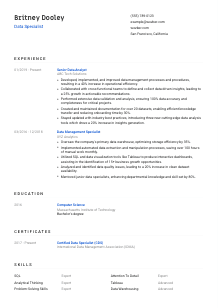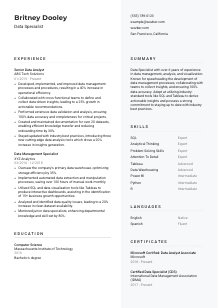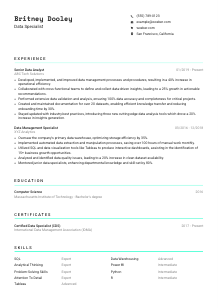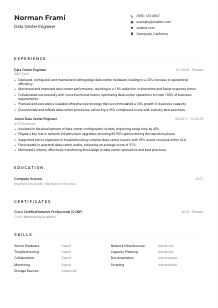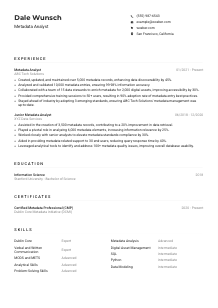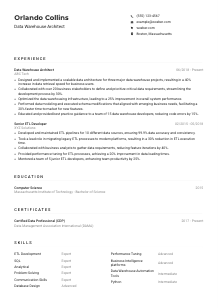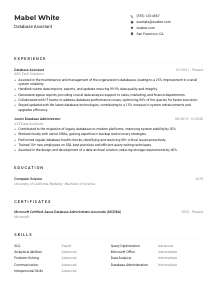Data Specialist Resume Example
Diving deep into data, but your resume feels incomplete? Unearth the insights of this Data Specialist resume example, assembled with Wozber free resume builder. Grasp how to precisely map your data prowess to the precision points desired in job listings, positioning your career trajectory for optimum analysis and action!
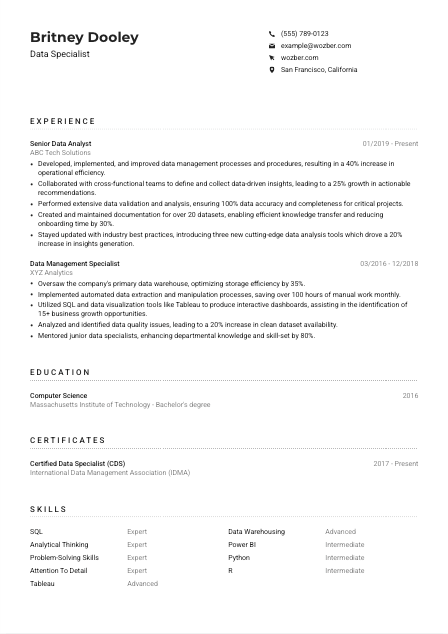
How to write a Data Specialist Resume?
Stepping into the realm of data specialization, crafting a resume that stands out is not just about listing your qualifications. It's an art - one that demands a keen sense of how to align your expertise with the fine-grained requirements of your dream job. With the fast-paced evolution of data management, a resume that snugly fits the job description is your golden ticket. Here's a tune-up guide to revamp your resume into a compelling narrative that not only speaks volumes about your data expertise but also sails through the Applicant Tracking Systems (ATS).
Ready to unlock the door to your next big opportunity as a Data Specialist? Dive in with the Wozber free resume builder, equipped with an ATS-friendly resume template and an ATS resume scanner for optimum ATS optimization.
Personal Details
In the data world, the devil is always in the details, and your resume's personal section is no exception. It's where you lay the groundwork, ensuring every piece of information about you is just as meticulously curated as the datasets you work with. Let's dive into refining the personal details segment of your Data Specialist resume to mirror the precision expected in the field.
1. Brand Yourself
A clear, readable font for your name is the bedrock of your professional brand. Think of it as the title of your dataset - it should be instantly recognizable and evoke professionalism. Imagine your resume in a stack; a well-presented name grabs attention like a well-designed dashboard.
2. Job Title Resonance
In the realm of data, alignment is key. Incorporate the exact job title "Data Specialist" beneath your name to immediately resonate with the hiring team. It's like matching a query result to a search parameter - instant relevance.
3. Pristine Contact Info
Ensure your contact number and email follow the same principle as clean data - no errors. A professional email format, such as firstname.lastname@email.com, positions you as a serious candidate, not an outlier in the dataset.
4. Location Advantage
Specifying "San Francisco, California" seamlessly matches you to a geographical requirement, reducing 'query time' for the hiring manager assessing your fitment. Think of it as efficient data retrieval - it's about making the match obvious and effortless.
5. Digital Presence
In today's data-driven landscape, a LinkedIn URL acts as a hyperlink to your professional storyline. Keep it current and reflective of your resume to build a robust, multifaceted profile - your comprehensive data visualization.
Takeaway
Your personal details section is the connect-string to potential employers. It's brief yet potent, setting the stage for the detailed analysis to come. Think of it as the metadata of your professional dossier. Keep it neat, error-free, and precisely aligned with the targeted role. Ready to craft the rest of your Data Specialist masterpiece? Let's keep the momentum going!





Experience
In the fast-evolving field of data specialization, your experience section is where you decode the complexities of your career into compelling insights. It's about showcasing projects and achievements that reflect the job description's call for a Data Specialist expert. Here's how to fine-tune your experience segment for maximum impact and ATS optimization.
- Developed, implemented, and improved data management processes and procedures, resulting in a 40% increase in operational efficiency.
- Collaborated with cross‑functional teams to define and collect data‑driven insights, leading to a 25% growth in actionable recommendations.
- Performed extensive data validation and analysis, ensuring 100% data accuracy and completeness for critical projects.
- Created and maintained documentation for over 20 datasets, enabling efficient knowledge transfer and reducing onboarding time by 30%.
- Stayed updated with industry best practices, introducing three new cutting‑edge data analysis tools which drove a 20% increase in insights generation.
- Oversaw the company's primary data warehouse, optimizing storage efficiency by 35%.
- Implemented automated data extraction and manipulation processes, saving over 100 hours of manual work monthly.
- Utilized SQL and data visualization tools like Tableau to produce interactive dashboards, assisting in the identification of 15+ business growth opportunities.
- Analyzed and identified data quality issues, leading to a 20% increase in clean dataset availability.
- Mentored junior data specialists, enhancing departmental knowledge and skill‑set by 80%.
1. Decode the Description
Start with an analytical deep dive into the job description. Extract essential keywords like 'data management processes' and 'data-driven insights' to align your described roles. It's akin to using the right syntax in a query - precision leads to desired outcomes.
2. Present with Precision
Structuring your past roles clearly is akin to presenting a clean, filtered dataset. List company names, positions, and tenure crisply. Each role is a table in your database, organized for easy access and understanding.
3. Accomplishments That Speak Volumes
Quantifiable achievements, like "increased operational efficiency by 40%", act like data points validating your expertise. It's not just about what you did, but the measurable impact you created, mirrored against the job needs.
4. Relevant Skill Emphasis
Similar to optimizing a query, pinpoint experiences relevant to data specialization - SQL expertise, tool proficiency (e.g., Tableau), or collaboration on data insights. This ensures relevance and enhances readability, filtering out 'noise' from your career narrative.
5. The Detail in Data
Ensure every point, like improving data accuracy or tool adoption, underlines your data finesse. Like fine-tuning a complex algorithm, the details in your experiences should crystallize your role as a data maestro.
Takeaway
Your Experience section is now a curated collection of your professional milestones, each chosen for its relevance and impact. Like a well-constructed database, it's organized, efficient, and speaks directly to the needs of your target role. Next up? Solidifying your academic and training foundation. Onwards to education!
Education
In the schema of your resume, the Education section holds a pivotal role, especially in the data realm. It lays the foundation, affirming you have the academic base to support your practical achievements. Let's ensure your educational background is presented with clarity and aligns perfectly with the job requirements for a Data Specialist.
1. Requirement Mapping
Much like analyzing a dataset for insights, start by extracting the essential educational requirements from the job description. A "Bachelor's degree in Computer Science" is not just a detail; it's a criterion you match perfectly.
2. Clear Structure
Your educational background should be as organized as a well-maintained database. List your degree, field of study, institution, and graduation year clearly. This section tells the story of where your journey in data began.
3. Degree Detailing
In data specialization, specifics matter. If your degree aligns perfectly with the job's educational criteria, it's crucial to spotlight that. Your "Bachelor's degree in Computer Science" is a key query result meeting the job's search condition.
4. Coursework Counts
For roles deeply embedded in technical skills, highlighting relevant coursework or projects can add depth to your claim of expertise. While not explicitly required for our example, consider this tool when applying for positions requiring niche knowledge.
5. Additional Accolades
If you have academic achievements that underscore your fit for the role - whether it's honors that highlight your dedication or projects that showcase your skills - make sure they're noted. Just like in a data model, every element adds to the completeness and relevance.
Takeaway
Just as a solid database is crucial for any data-driven decision, a well-presented Education section is foundational to your resume. It confirms your capacity for the role with academic credibility. With your educational qualifications squared away, let's shift focus to the extra certifications that enhance your resume's value proposition.
Certificates
In a profession where staying updated is key to success, certifications are golden. They sharpen your skillset, keeping you ahead in the technological race. But with space at a premium on your resume, choosing which certifications to highlight requires a strategy. Let's dive into optimizing your Certificates section to illustrate your continuous learning trajectory and expertise in the data specialization field.
1. Align with Expectations
First off, gauge the job's requirements. Did they mention SQL or analytics certifications as an advantage? Even if not explicitly stated, certifications like "Certified Data Specialist (CDS)" or "Microsoft Certified: Data Analyst Associate" solidify your standing by matching the implied expectations.
2. Selectivity Speaks
In the realm of data, relevance is king. Include certifications that directly enhance your candidacy for the Data Specialist role. It's about quality, not quantity - every certificate listed should elevate your resume's competency narrative.
3. Dates Matter
Technology evolves; so does the relevance of certifications. Provide dates to assure hiring managers of your up-to-date expertise. Think of it as versioning in software - it demonstrates your knowledge is current.
4. Continuous Upskilling
The data field never stands still, and neither should you. Highlighting recent certifications or ongoing education can position you as a proactive professional, eager to stay at the forefront of industry trends and best practices.
Takeaway
Just as algorithms refine data for optimal outputs, selecting and presenting your certifications strategically refines your resume. It's a testament to your dedication to personal development and professional excellence. Onward to showcasing the technical and analytic prowess that makes you a perfect fit for the Data Specialist role.
Skills
The Skills section of your resume is your professional toolset laid bare. It's where you distill your technological proficiency and analytical acumen into a concise list that speaks directly to what the job description seeks. Let's ensure your list of skills reflects the expertise a Data Specialist must wield, both for manning the data trenches and for gliding through ATS checks with ease.
1. Analyze and Adapt
Begin by breaking down the job description to identify both explicit and implicit skills required. An authoritative command over SQL, analytical thinking, and proficiency with tools like Tableau and Power BI are non-negotiables for your profession. Ensuring these skills are front and center on your resume speaks directly to the heart of the role.
2. Prioritize Precision
Match the skills you list to those sought in the job description meticulously. This tailored approach not only reflects ATS optimization practices but also showcases your keen eye for detail - a critical trait for a Data Specialist.
3. Neatness and Clarity
Your skills section should be as organized as a well-maintained database. Limit your list to core competencies that elevate you as a Data Specialist, ensuring each skill contributes to a portrait of a candidate who's both technically savvy and analytically sharp.
Takeaway
Just as a refined algorithm outputs clean, actionable data, your refined skills section should output a clear message: You're the ideal Data Specialist for the job. With precision, clarity, and relevance, your skills are now perfectly positioned to capture the hiring manager's interest. Next, let's communicate your global connectivity through your linguistic capabilities.
Languages
In the kaleidoscope of data specialization, the languages you speak add another dimension to your professional profile. Beyond coding languages, your fluency in spoken and written languages can symbolize your ability to navigate global datasets and collaborate across borders. Let's curate the Languages section of your resume to accentuate your communication skills and global mindset.
1. Essential English
Given that proficiency in English is a must for the job, position it prominently as a skill, categorizing yourself as 'Native' or 'Fluent.' It directly answers the job's call, ensuring no query goes unanswered about your ability to perform duties in the global lingua franca.
2. Additional Linguistic Assets
While the focus is on English, other languages you speak can showcase your versatility and readiness to engage in multi-cultural environments. Each language is a unique keyword, potentially aligning with unspoken needs of the role.
3. Honesty in Proficiency
Clearly indicate your level of proficiency in each language. Like managing expectations in a dataset's usability, being upfront about your linguistic capabilities sets a clear scope of your communication skills.
4. Cultivate Curiosity
In an ever-connected world, even basic proficiency in additional languages can pique interest. It reflects your openness to learning and adapting - valuable traits in the fluid domain of data.
5. Role Relevance
Consider the global or regional scope of the Data Specialist role. If interfacing with international datasets or teams is a part of the job, your multilingual abilities could elevate your candidacy from suitable to standout.
Takeaway
Your Languages section is now a testament to your ability to communicate and connect across cultures. In data, as in language, comprehension is key, and you've just shown you're equipped to handle both with expertise. Ready to compile all we've curated into a summary that encapsulates your Data Specialist candidacy? Let's move on to compile your professional narrative.
Summary
The Summary section is your resume's opening statement, the hook that draws the reader in. A compelling summary for a Data Specialist must blend your technical skills, your analytical prowess, and your professional achievements into a concise, engaging narrative. Let's craft a summary that encapsulates your unique value proposition, appealing directly to the hiring manager's search for a top-tier candidate.
1. Capture the Core
Distill the job description's essence and mirror it with your experience and skills. A sentence like 'Data Specialist with over 6 years of experience in data management, analysis, and visualization' instantly aligns your expertise with the role's requirements.
2. Highlight Significant Achievements
Select bullet points of achievements that resonate most with the job description. Quantifying your impact, such as 'leading to a 25% growth in actionable recommendations,' showcases your capacity to catalyze significant advancements.
3. Skill Synthesis
Briefly touch upon the key skills that prepare you for the Data Specialist role, such as SQL proficiency or your mastery of data visualization tools. It's like summarizing the variables that define a successful experiment.
4. Brevity is Brilliance
Keep your summary succinct. Aim for a punchy narrative that's a teaser of your qualifications, skills, and achievements. Think of it as the abstract to your professional paper - make every word count.
Takeaway
Your resume's Summary now serves as a powerful introduction to your candidacy. As the prelude to the detailed professional story that follows, it sets a high bar, inviting the hiring manager to dive deeper. You've crafted a document that not only fits the job description but also showcases the unique individual behind it. Armed with this precision-engineered resume, created with the assistance of Wozber's free resume builder, including an ATS-friendly resume template and ATS optimization tools, your application is primed for success. Remember, every dataset has a story, and every job application is an opportunity to tell yours. Let your resume be the key that unlocks the next chapter in your Data Specialist career.
Conclusion
Congratulations on completing a comprehensive revamp of your Data Specialist resume! With a document that finely maps your skills and experience to the targeted job description, you've set a strong course to catch the eye of hiring managers. Tailored, ATS-optimized, and reflective of your professional journey, your resume is now a beacon highlighting your expertise. Leveraging tools like Wozber's free resume builder, ATS-friendly resume templates, and ATS resume scanner, you've crafted a resume that speaks the language of both hiring professionals and application tracking systems. The data world is vast, filled with unexplored opportunities and challenges.
With your meticulously prepared resume in hand, you're ready to dive in. Here's to your success as a Data Specialist. The future is bright, and it's waiting for you to analyze, interpret, and ultimately, conquer. Wozber is here to support you every step of the way.

- Bachelor's degree in Computer Science, Information Systems, or a related quantitative field.
- Minimum of 3 years of experience in data analysis, data management, or a related field.
- Proficiency with SQL for data manipulation and extraction.
- Experience working with data visualization tools, such as Tableau or Power BI.
- Strong analytical thinking, problem-solving skills, and attention to detail.
- Certification in SQL or relevant data analytics certifications is a plus.
- Ability to perform job duties in English is essential.
- Must be located in San Francisco, CA.
- Develop, implement, and continuously improve data management processes and procedures.
- Collaborate with cross-functional teams to define and collect data-driven insights and metrics.
- Perform data extraction, data validation, and analysis to ensure data accuracy and completeness.
- Create and maintain documentation for datasets and processes, including data dictionaries and standard operating procedures.
- Stay updated with industry best practices, tools, and trends to ensure the organization's data practices are up to date and effective.





